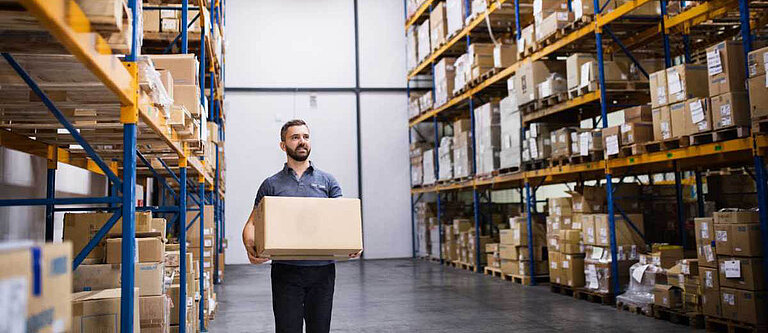Logistics meaning: The definition and importance of logistics for companies

Logistics is a key part of the business world, keeping the global economy running. It includes all the processes that help companies work smoothly.
In this article, we’ll explain what logistics means and why it’s so important for businesses. You’ll be amazed at what happens behind the scenes to make everything run seamlessly!
What is logistics? The definition simply explained
According to the definition, (business) logistics means "supplying" and involves the process of providing someone, a group, or a company with everything they need. Logistics encompasses the planning and control of goods flow.
In a broader sense, logistics also includes the transportation of people and information. However, in this article, we're focusing on goods, specifically logistics for businesses - our expertise.
The term "logistics" originates from ancient Greek and roughly translates to "arithmetic".
It's no surprise because ensuring all the necessary goods reach the right place at the right time is an incredibly complex task. Logistics serves as the lifeblood of the global economy, without which nothing would function.
Wherever you may be - at home, in the office, or on the go - take a moment to observe your surroundings. Everything around you has been produced somewhere and delivered to its location. The chair you're sitting on, the mobile phone you're reading on, and even the train you're riding in - numerous logistics companies were involved in getting the necessary materials to the producer and eventually to you, often through indirect routes.

Because without smooth logistics processes:
- Numerous supermarket shelves would remain empty as food needs to be restocked regularly.
- No packages would reach you from online shops if items are out of stock.
- Gas pumps would run dry as tankers fail to arrive.
- Production of various goods would come to a halt due to missing components - be it for laptops, vehicles, furniture, medicines, or building materials like bricks and cement.
To avoid these scenarios, logistics processes around the world ensure an uninterrupted supply chain.
What is the definition and meaning of a logistics company?
The logistics industry is one of the largest in the world!
- According to the U.S. Bureau of Labor Statistics (BLS), there are be more than 1.6 million logistics workers.
- In 2020, the turnover of the North American logistics market was put at more than 2 trillion US dollars
This massive number of employees is involved in various aspects of the logistics process, which is often referred to as the "supply chain" - more on that below.
The logistics industry encompasses a range of companies, including:
- Transport companies and freight forwarders, which handle the movement of raw materials and goods primarily through land transportation using trucks and airplanes, as well as sea transportation.
Some of the biggest freight forwarders globally are Kühne + Nagel, DHL, DB Schenker, Panalpina, and Sinotrans.
- Shipping companies, renowned for their mammoth container ships specialized in transporting goods from overseas. Notable shipping companies include MSC, APM-Maersk, COSCO, Hapag-Lloyd and Mediterranean Shipping.
- Shipping service providers that deliver packages from online shops to their customers. Many large shipping services also take on forwarding tasks. DHL, GLS, UPS, FedEx and Royal Mail are just a few examples.
- Fulfillment providers like Quivo, which handle all logistics for e-commerce shops.
- Warehouses that (temporarily) store goods on a long-term basis. Many warehouses belong to or are rented by the largest freight forwarders and logistics groups:
Deutsche Post DHL, DB Mobility, Maersk, FedEx, UPS and Co.
- Packaging companies that (pre-)package goods in large quantities.

The logistics branches and sub-fields explained
There are numerous sub-areas within business logistics, all of which work together to ensure a seamless journey from A to B:
One of these sub-areas is procurement logistics: its main focus is to ensure that the right parts and materials for production are available when needed.
Let's take the example of a company that manufactures smartphones. To produce these devices, all the individual parts must be delivered on time. This responsibility falls under procurement logistics.
Then we have production logistics: its role is to keep everything running smoothly within the factories. It revolves around optimizing production processes to achieve the desired quantity and quality of goods.
Production logistics takes care of the smooth flow of materials and coordinates the use of machines and labor to enhance production efficiency. The goal is to avoid bottlenecks and ensure the entire production process is well-coordinated.
But that's not all, as we also have distribution logistics. Its primary task is to ensure that finished products find their way to the customers.
So, when you hold your brand-new smartphone in your hands, you can thank distribution logistics for a job well done.
- And last but not least, we have the disposal logistics! It may not sound so glamorous, but it is enormously important. Here, everything revolves around what happens when goods are no longer needed. Disposal logistics takes care of the environmentally friendly and proper disposal or recycling of materials and products between each of the different logistics sub-sectors.
- Often forgotten is warehouse logistics, which is becoming more and more of a focus as more and more is ordered: It takes care of the correct storage of goods.
You can imagine it like this: When you order something in an online shop, the things have to be stored somewhere before they are sent to you. Warehouse logistics manages all the chaos and makes sure that everything has its place, is easy to find and that orders are shipped immediately. That's our business - the so-called "fulfillment".
- Finally, there is transport logistics, which is also part of distribution logistics and is used in every intermediate step. This is about how to move goods from one place to another. Whether it's by lorry, train, plane or ship - transport logistics takes care that things arrive safely and as quickly as possible.
We also offer this service for companies with our own transport department!
And voilà, now all sub-fields of logistics are covered! From transport and storage to procurement and distribution to production and disposal - logistics really is a multifaceted and important field that accompanies us in our everyday lives, even if we sometimes don't even notice it.
Of course, none of this works by itself. Many cool technologies are used in logistics, such as GPS, to track and coordinate everything. In addition, numerous people work together in these sub-areas and make the whole thing possible in the first place.

What is a supply chain?

A supply chain is an interlocking transport network that ensures a constant flow of goods.
It consists of various stations, which are:
- Procurement (of raw materials and goods)
- Supply (to the producer)
- Production (manufacturer)
- Distribution (warehousing, forwarding agencies)
- Traders (stationary shops and online shops)
- Customers (shipping services)
- Disposal & recycling (logistics companies)
Logistics for companies: A Closer Look at the US Market
In the vast and diverse landscape of the United States, understanding the logistics meaning in business is crucial for navigating the complexities of its market. The term logistics, within the business context of the US, embodies more than just the transportation and delivery of goods.
It represents a comprehensive system of supply chain management that is vital for the seamless operation of businesses across this expansive nation. From the bustling ports of the East Coast to the tech hubs of the West Coast, logistics meaning in business in the US involves tailor-made solutions that cater to varied regional demands and consumer behaviors. The US, known for its large-scale retail and e-commerce sectors, demands a highly efficient logistics system capable of managing vast inventories, complex distribution networks, and rapid delivery expectations.
Moreover, logistics meaning in business in the US context also entails adapting to the country's unique infrastructural and regulatory landscapes. For instance, the logistics strategy in the US must consider the extensive interstate highway system, the role of major freight railroads, and the influence of major shipping lanes and air freight routes. This understanding of logistics is fundamental for businesses to effectively penetrate the American market, where the speed, accuracy, and cost-effectiveness of supply chain operations can significantly impact customer satisfaction and business profitability.
Hence, in the US, the logistics meaning in business goes beyond mere movement and storage of goods; it is about creating a dynamic, responsive, and efficient network that aligns with the country's unique market requirements and consumer expectations.
What does "just in time" mean?
The very precise, ongoing coordination of each intermediate step in a supply chain is enormously important in order to use resources wisely and work economically.
This system is called "just in time" - just in time: so much is always delivered when it is needed. Efficiency is a top priority here and care is taken not to overload any intermediate station.
So that manufacturers have enough material available to process in a certain quantity or the shops are supplied with the right amount of products without, for example, having to dispose of too much perishable goods unsold.
A practical example: the smartphone supply chain
You urgently need a new mobile phone and are looking for the latest craze on the Internet. Et voilà - you find what you are looking for on a well-known Internet portal; your desired model is still in stock 4 times. One click and you've ordered it!
But what was necessary to make it work? This is roughly what the supply chain looks like - with numerous logisticians who make sure that nothing stands still:
- Transport companies or forwarding agents regularly bring agreed quantities of material from raw material manufacturers to various mobile phone parts producers.
These supplier companies transport finished mobile phone parts at precisely regulated intervals either to other supplier companies or directly to the factory of the major mobile phone brand.
The smartphone company expects a constant flow of very specific quantities of mobile phone parts so that production does not come to a standstill - which can lead to great losses of time and money.
Retailers around the world contract with smartphone companies and expect them to deliver their goods at precise times. If the vendors' "shelves" are not sufficiently stocked, their sales suffer and they potentially lose many customers.
To this end, large quantities of goods - mostly from Asia - are often shipped to the warehouses of sellers, online shops or fulfilment providers like LOGSTA, worldwide:
- This is where you come in and order your new smartphone.
- Your order arrives at the responsible logistics company in the fulfilment warehouse, where your phone is immediately packed and handed over to shipping service providers such as the post office.
- The shipping service finally brings the smartphone to your doorstep.
- What happens to your old, broken mobile phone? Of course, you don't throw something so valuable into the residual waste, but take it to a recycling centre where old mobile phones can be collected and partially recycled.
- Here, too, logisticians ultimately come into play who take care of the transport to the recycling or disposal sites.
![[Translate to US:] Unboxing a parcel](/fileadmin/_processed_/4/f/csm_Logistik_Unboxing_85f77981ce.jpg)
If you have any questions about logistics or need support with your logistics, we're happy to help!
Just write to us! We'll take care of it.
Sources
- These are the largest transport companies in the world
www.capital.de
- Statistics and market volume of the logistics market - Statista
en.statista.com
- BASICS OF LOGISTICS: NOT MUCH WORKS WITHOUT IT
www.oncampus.de/blog/
Image sources:
LOGSTA / Quivo © 2024
Canva







